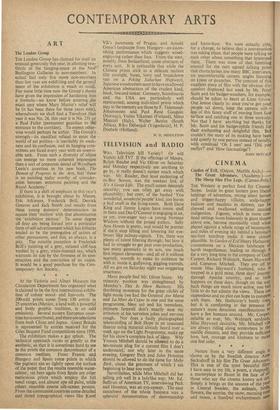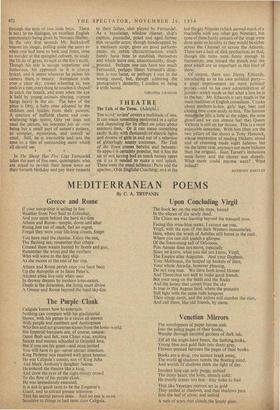CINEMA
Garden of Evil. (Odeon, Marble Arch.)---- The Great Adventure. (Academy.)----- The Sheep Has Five Legs. (Cameo-Poly.) THE Western is perfect food for Cinema- Scope. Inside its great lantern jaws liberal helpings of adventure, strong silent heroes and trigger-happy villains, scalp-happy Indians and maidens in distress, can be chewed and swallowed without causin8 indigestion. Figures, which in more con' fined settings loom hideously in giant shapes above one, become reasonably sized when placed against a whole range of mountains, and miles of evening sky behind a heroine's ten-foot teardrop make it seem almost plausible. In Garden of Evil Henry Hathaway,. concentrates on a Mexican landscape of harsh magnificence, leading us through it for a very long time in the company of Gal Cooper, Richard Widmark, Susan Hayward and Cameron Mitchell. They are off to rescue Miss Hayward's husband, who is trapped in a gold mine, three days' journeY through Apache country, and so little happens on these days, though on the we back things are much more active, one has little to do but admire the views. These are stupendous and no plot can hope to compete with them. Mr. Hathaway's barely tries, but it is comforting in the presence of nature's more ferocious manifestations to have a few humans around. Mr. Coop!r, reliable as ever, Mr. Widmark sardonlef Miss Hayward desirable, Mr. Mitchell vile are always riding along somewhere in the middle distance, and they provide sufficient love, lust, courage and kindness to make one feel safer.
*
Nature from a very different angle shown us by the Swedish director Arne Sucksdorff in his film The Great Adventure. This is one of the most beautiful Otis I have seen in my life, a poem, a rhapsodY.; a masterpiece to flaunt in the face of all those who say the cinema knows not Li:, Simply it brings us the seasons of the Yea,: in Central Sweden, the animals, birds. flowers, the sunrise, the snow, morning oils" and moon, a hundred enchantments see' through the eyes of two little boys. There• Is next to no dialogue, an excellent English commentary being given by Norman Shelley. In the very first seconds Mr. Sucksdorff weaves his magic, pulling aside the years to when one had time to look and listen, time to wonder at the spangled cobweb, to study the bILde of grass, to wait at the fox's earth. Though his talc is savage sometimes and humorous, his approach to it is always lyrical, and it seems wherever he points his camera there is beauty. Aeroplane trails over a clear sky, cranes wheeling in, two owls in a tree, everything he touches is shaped to catch the breath, and even when the eye is held by young animals playing, rapture hangs heavy in the air. The hero of the piece is Otty, a baby otter adopted by the children and hidden from their parents. A creature of ineffable charm and over- whelming high spirits, Otty yet does not steal the picture, his innocent Joie de vivre being but a small part of nature's pattern, so complex, mysterious, and overall so cruel. Still, he is irresistible and sets the tone to a film of outstanding merit which
all should see. * * In The Sheep Has Five Legs Fernandel takes the part of five men, quintuplets, who are asked to re-visit their home town on their fortieth birthday and pay their respects
to their father, also played by Fernandel. As a beautician, window cleaner, ship's captain, journalist, priest and aged farmer this versatile actor, though handicapped by a mediocre script, gives six good perform- ances, six subtle characterisations which barely have time to establish themselves and which leave one, unaccountably, disap- pointed. Perhaps one can have too much Fernandel, perhaps Henri Verneuil's direc- tion is too loose, or perhaps I was in the wrong mood, but, though admiring the protagonist's dexterity, I confess to being a trifle bored.
VIRGINIA GRAHAM











































 Previous page
Previous page